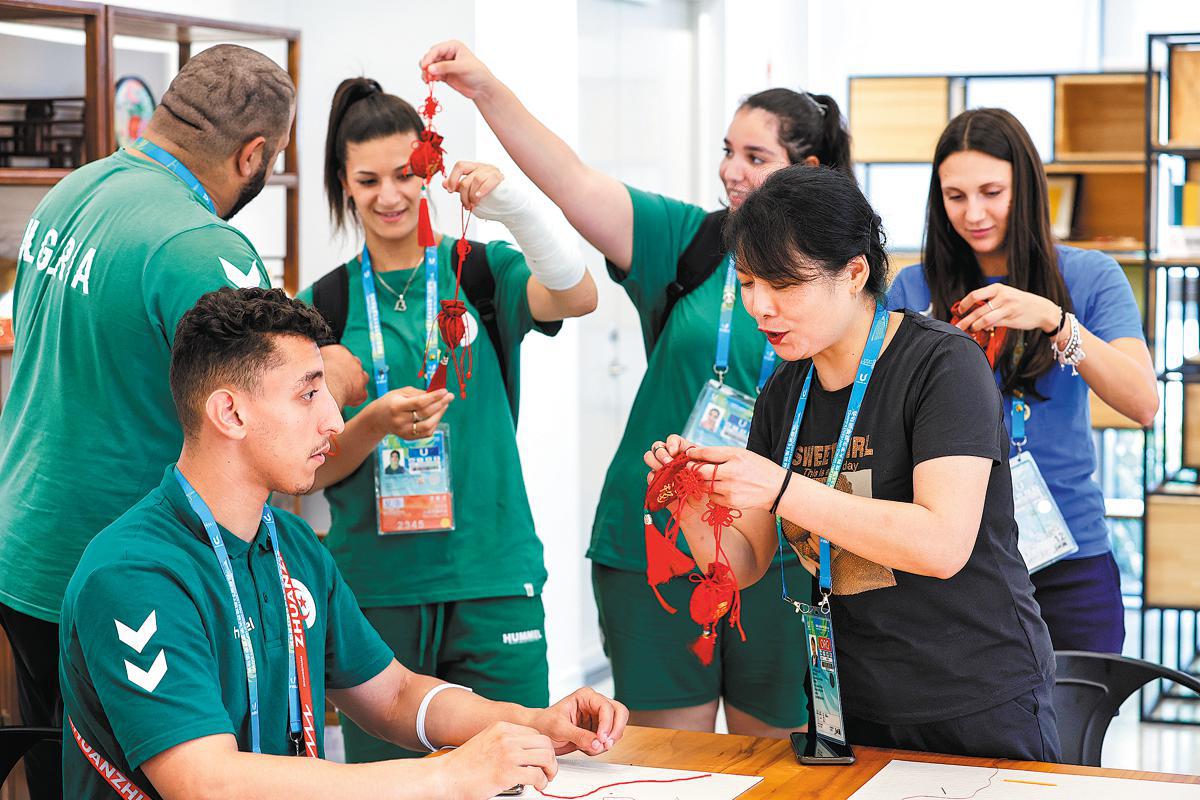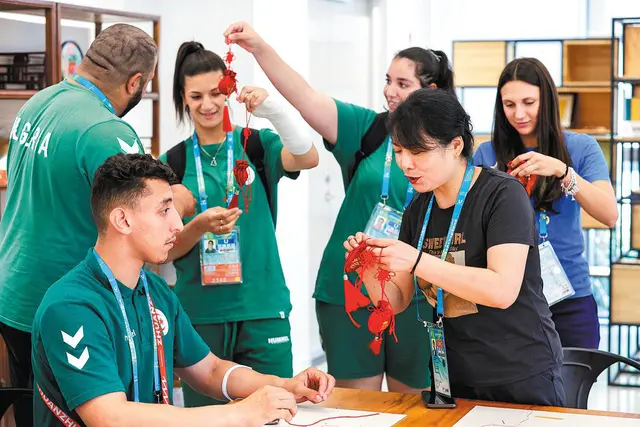From spirited games of pitch-pot and cuju, the early forerunner of modern soccer, to the cerebral challenges of Chinese chess, athletes from various nations and regions have found themselves spellbound by the wonders of Chinese culture at a fair in the Chengdu FISU Games Village in Chengdu, capital of Sichuan province.

Foreign athletes learn to make sachets with the help of Yang Huajuan (second from right), a representative successor of the embroidery of the Qiang ethnic group, at the FISU Games Village in Chengdu, Sichuan province, on Thursday. [Photo/Xinhua]
The Chengdu FISU World University Games are in the midst of intense sporting battles, while the FISU Games Village has become a melting pot of cultural encounters.
At the cultural fair, which exudes the charm of ancient traditions, participants have the opportunity to don exquisite hanfu, traditional Chinese attire, and indulge in traditional Chinese makeup and manicures, creating memorable moments through captivating photos.
Additionally, the fair offers a splendid array of Chinese-style products, including tea ware, porcelain and handicrafts, allowing attendees to choose delightful souvenirs for their loved ones.
Turkish archer Efe Gurkan Maras may not have made it to the podium in his competitions, but he managed to find the perfect gift for his mother at the fair — a beautiful hand-painted paper fan in her favorite shade of pink.
"She has a fondness for both the color pink and Chinese items. I'm sure she'll adore this fan. I also plan to surprise her by purchasing a paper umbrella," he said.
The 21-year-old table tennis player Mahammad Ansari from Azerbaijan was captivated by the Chinese knot. Expressing his fondness for the artwork, he said he was going to hang the one that he bought in his room when he returns home.
The Chengdu FISU Games Village is situated within the campus of Chengdu University, covering an extensive area of approximately 800,000 square meters.
The village consists of 10 apartment buildings, two athlete dining halls and several other essential facilities including the delegation service center, medical center, fitness center and various other amenities.
One of the most popular spots is the Leisure in Tianfu Experience Hall, where visitors can marvel at various ancient Chinese customs.
The traditional Chinese medicine experience zone has also become a focal point of interest. Approximately 20 skilled traditional Chinese medicine practitioners offer services including acupoint massage and cupping therapy to both athletes and delegation officials, allowing them to discover the special advantages of traditional Chinese medicine in the realm of sports medicine.
The Chinese calligraphy experience section is also quite popular. Three Australian athletes came to learn how to write their names in Chinese. Luke Dominic Boyes, an 800-meter runner, wrote his first name with two Chinese characters and said that it was complicated but also fun.
"I also want to try on hanfu next time," Boyes said.
At the tea section, French official Jerome Dupel is a regular guest and visits almost every day, saying that he has a strong liking for green tea and white tea.
During the Chengdu games, there are 56 daily sessions of intangible cultural heritage and traditional cultural experience activities in the village, showcasing representative projects from various cities and prefectures across Sichuan province, including paper-cutting, Sichuan embroidery, shadow puppetry and bamboo weaving.
"We have seven shows every day, from 9 am to 7 pm, with each performance lasting approximately half an hour," said Zhao Hong, an inheritor of Chengdu's intangible cultural heritage, shadow puppetry.
Zhao took center stage with daily performances in the village and also led the audience in trying their hand at personally coloring and assembling their favorite shadow puppet characters and taking part in a performance.
A gala was also held on Sunday at the ASEAN Art Center Theater in the village, uniting cultures from many nations.
A Sichuan opera actor not only performed the face-changing performance just next to the audience, but also taught rower Jack Matthew Dunn from the United States two Sichuan opera moves on stage.
The cultural exchange activities in the village allowed young people from around the world to gather and get to know each other, said Dong Cheng, executive deputy head of the village.
The activities also enhance friendship, let the athletes experience and share Chinese civilization and culture, and promote the common values of all mankind, Dong said.
(CHINADAILY)
 简体中文
简体中文

